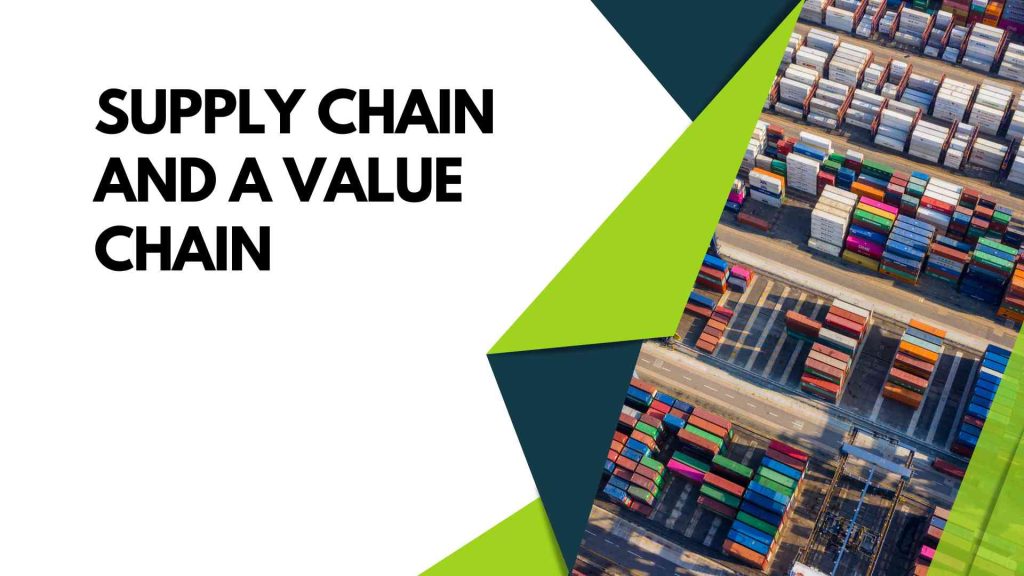In today’s globalized and interconnected world, businesses operate in complex environments where efficiency, competitiveness, and customer satisfaction are paramount. Supply chain and value chain frameworks help organizations achieve these goals. We will explore how they contribute to the success of manufacturing and distribution businesses.
What is a Supply Chain?
The supply chain is directed to the interconnected network of individuals, companies, resources, activities, and technologies that create and distribute goods and services from raw materials to the end consumer. It encompasses the entire lifecycle of a product or service, from its initial conception to its delivery to the customer. A well-optimized supply chain ensures that products are produced, transported, and delivered efficiently, minimizing costs and maximizing customer satisfaction.
What is a Value Chain?
On the other hand, a value chain is the sequence of activities performed to create, deliver, and capture customer value. A company’s value chain encompasses primary actions (production, marketing, sales, and customer assistance) and support activities (like procurement, technology development, human resources, and infrastructure). These contribute to the overall value-creation process.
What are the Challenges in Supply Chain?
- Demand Forecasting
- Inventory Management
- Transportation and Logistics
- Supplier Relationships
- Lead Time Reduction
- Risk Management
- Supply Chain Visibility
- Global Sourcing
- Sustainability
- Regulatory Compliance
What are the Challenges in Value Chain?
- Innovation Management
- Cost Efficiency
- Quality Control
- Customer Experience
- Talent Acquisition and Retention
- Technology Integration
- Market Differentiation
- Environmental Sustainability
- Supply Chain Integration
- Competitive Pressures
What are the Factors for Supply Chain Efficiency and Success?
Collaboration: Effective communication and collaboration among suppliers, manufacturers, distributors, and retailers help in aligning goals, sharing information, and optimizing processes.
Demand Forecasting: Accurate predictions of customer demand enable better planning, preventing overproduction or stockouts.
Inventory Management: Balancing inventory levels to avoid excess stock or shortages, reducing carrying costs, and improving responsiveness.
Logistics and Transportation: Efficient transportation and management reduce lead times, costs, and environmental impacts.
Technology Integration: Utilizing technologies like RFID, IoT, and data analytics allows real-time monitoring, tracking, and analysis of the supply chain, leading to better decision-making.
Risk Management: Identifying and addressing potential disruptions, such as natural disasters or geopolitical issues, helps ensure continuity in the supply chain.
Supplier Relationships: Building relationships with reliable suppliers contributes to consistent quality and timely materials delivery.
What are the Factors for Value Chain Success?
Innovation: Constantly seeking ways to improve processes, products, and services to have higher significance to customers.
Efficiency: Streamlining operations and reducing waste at every value chain stage enhances efficiency and cost-effectiveness.
Customer Focus: Understanding and meeting customer needs and preferences is crucial for delivering value that aligns with their expectations.
Differentiation: Developing unique features and capabilities that set a company’s products or services apart from competitors adds value and justifies premium pricing.
Talent Management: A skilled and motivated workforce contributes to the quality of products and services and drives innovation.
Technology Adoption: Integrating advanced technologies into various value chain activities can boost productivity and create new opportunities.
Sustainability: Incorporating sustainable practices helps the environment and appeals to environmentally conscious customers.
What is the Significance of Supply Chain and Value Chain?
Both supply chains and value chains play pivotal roles in modern business strategies:
- Efficiency and Cost Reduction: Optimizing supply chains reduces operational costs, enhances resource utilization, and improves profit margins.
- Customer Satisfaction: Well-managed value chains ensure products are tailored to meet customer needs, leading to higher satisfaction and loyalty.
- Competitive Advantage: A well-structured value chain can create a sustainable competitive advantage by offering unique value that competitors struggle to replicate.
- Innovation: Value chains encourage innovation by continuously seeking ways to enhance processes, products, and services.
- Global Reach: Efficient supply chains facilitate international trade, allowing products to reach distant markets with minimal delays.
- Risk Management: Supply and value chains can mitigate risks through diversification, redundancy, and effective planning.
In essence, supply and value chains are integral concepts that define how businesses operate, create value, and contribute to the overall victory of an organization. By mastering these concepts and implementing plans to enhance them, firms can achieve higher efficiency, profitability, and competitiveness in the ever-evolving enterprise landscape.
How Acumatica Can Enhance Supply Chain and Value Chain?
Acumatica cloud ERPempowers organizations to optimize their supply and value chain processes by providing a comprehensive and integrated platform. Through its advanced features in demand forecasting, inventory management, logistics, and supplier collaboration, Acumatica cloud ERP enhances supply chain efficiency, minimizing costs and maximizing customer satisfaction.
Simultaneously, its innovation management, cost control, quality assurance, and real-time data analytics modules contribute to value chain excellence, enabling organizations to deliver tailored products and services, streamline operations, and maintain a competitive edge in the market. Acumatica’s seamless integration and holistic approach bring synergy to supply and value chains, fostering growth, innovation, and customer-centricity. Contact us for a customized ERP.

Vijay comes with a vast experience in ERP and enterprise solutions space with about 20 years of experience in various packaged application like Acumatica, SAP, Orion, Salesforce.com, SugarCRM and, SalesLogix.

